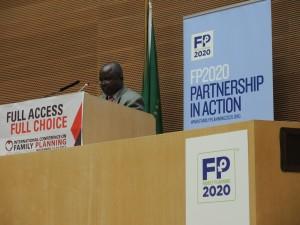
A new article in Global Health: Science and Practice describes the recent, high-level commitment to family planning in the Democratic Republic of the Congo (DRC). National leaders in the country, where nearly 28% of women have an unmet need for modern contraception, shifted their focus on family planning from “near virtual neglect to explicit, strong support” within a period of two years.
“For long-time observers of the policy environment for family planning, the recent changes in the DRC are unprecedented and groundbreaking,” the article’s authors state.
The year 2012 marked the turning point in the DRC’s support for family planning, according to the article.
- That year, the DRC government included family planning as one of six elements in its framework to accelerate achievement of the Millennium Development Goals to reduce child mortality and improve maternal health.
- In November 2013 at the 3rd International Conference on Family Planning in Addis Ababa, the Health Advisor to the Prime Minister on behalf of the government, pledged to revitalize family planning and joined the Family Planning 2020 partnership. The government committed to improve services by implementing and financially supporting the DRC’s recently-developed national strategic plan for family planning, reforming laws that pose barriers to planned births, and empowering women.
- Most recently, in December 2014, the Office of the Prime Minister sponsored the 3rd National Conference on Repositioning Family Planning in the DRC, during which the government doubled its family commitment in 2015 to US$2.5 million and approved national and provincial Permanent Multisectoral Technical Committees to further family planning objectives.
According to the authors, the favorable policy environment developed from a combination of factors, including: (1) recognition of the impact of family planning on maternal mortality and economic development; (2) knowledge sharing of best practices from other African countries; (3) participatory development of a national strategic plan; (4) strong collaboration between stakeholders; (5) effective advocacy by champions including country and international experts; and (6) increased donor support.
In this newly favorable environment for family planning, the authors write, “the larger question is whether change in the policy environment of a country will lead to effective programmatic action that translates into increased contraceptive use and decreased fertility rates.”
“Family Planning Policy Environment in the Democratic Republic of the Congo: Levers of Positive Change and Prospects for Sustainability” is co-authored by Thibaut Mukaba of the U.S. Agency for International Development/DRC; Arsene Binanga of Tulane International; and Sarah Fohl and Jane Bertrand of Tulane University School of Public Health and Tropical Medicine.
AFP partner Tulane International has collaborated with international experts and family planning champions to move family planning forward on the national public health agenda through informed and effective advocacy. Advocates are playing an important role in translating policies into action at national and subnational levels.
View the AFP case study: DRC Commits to Family Planning through the Global Family Planning 2020 Partnership.

